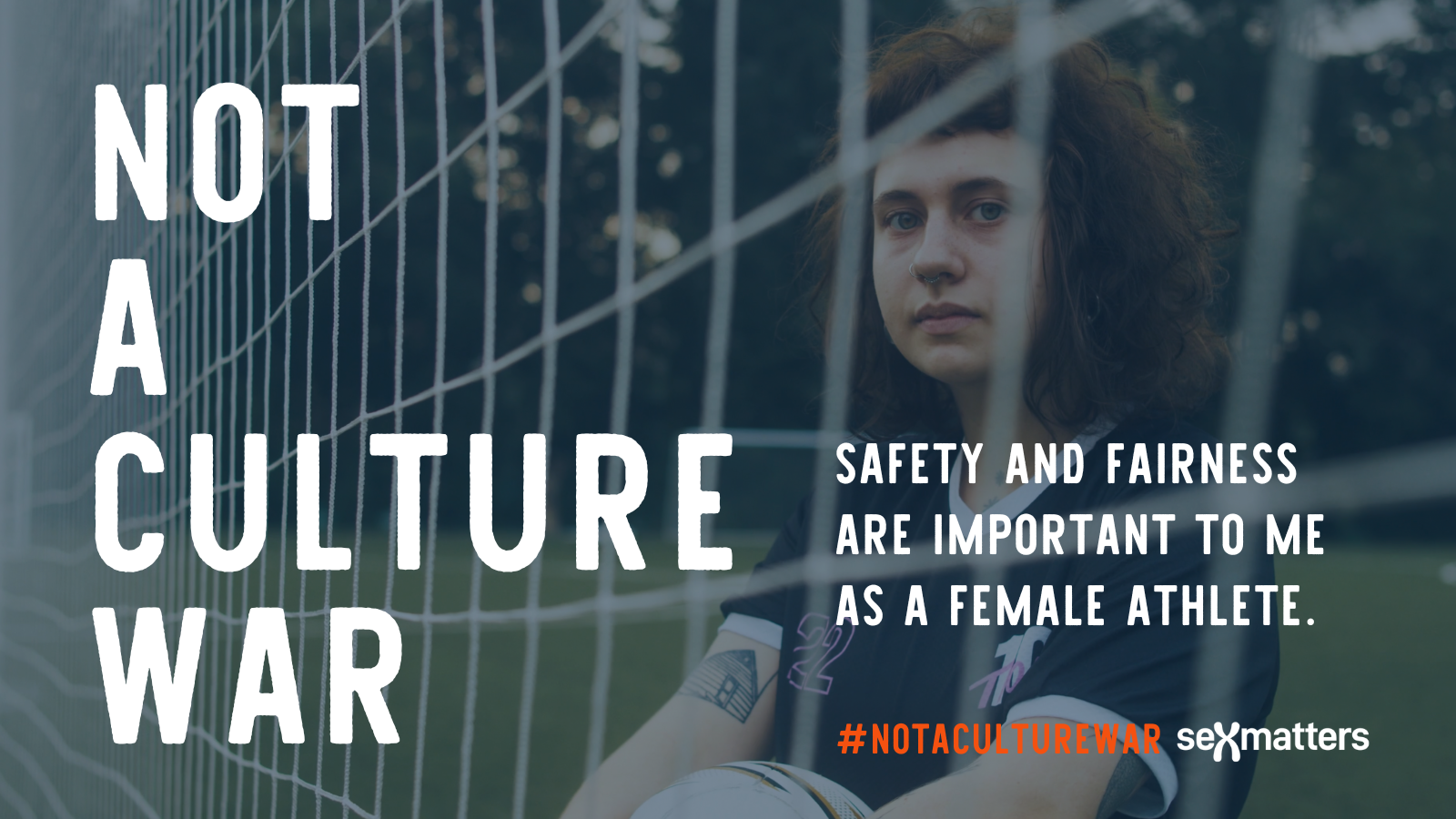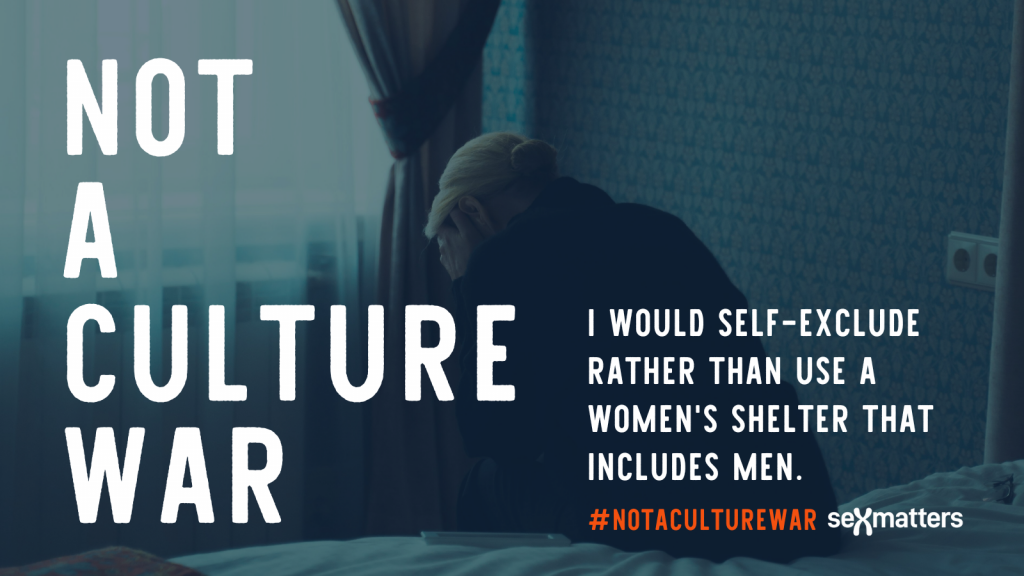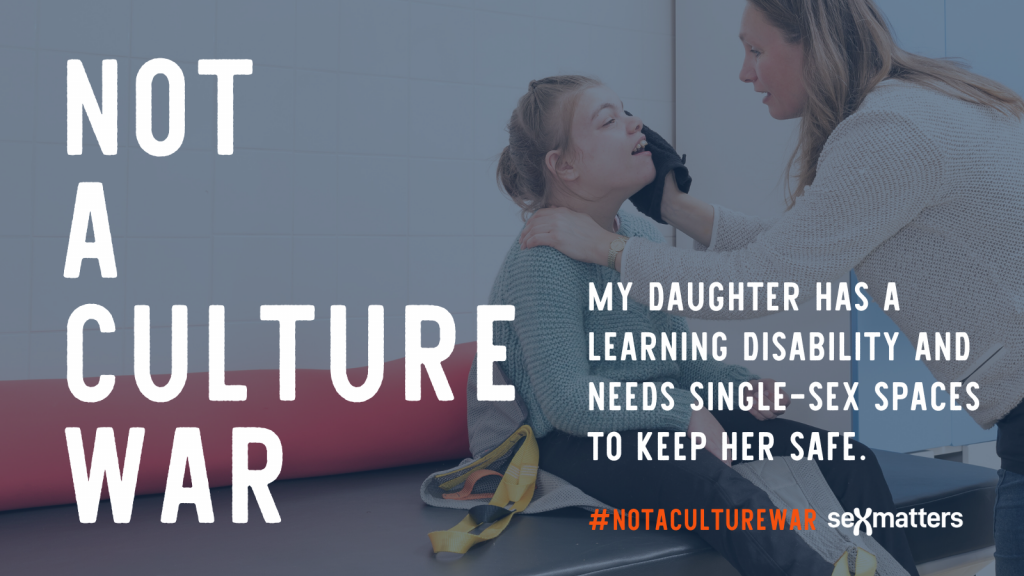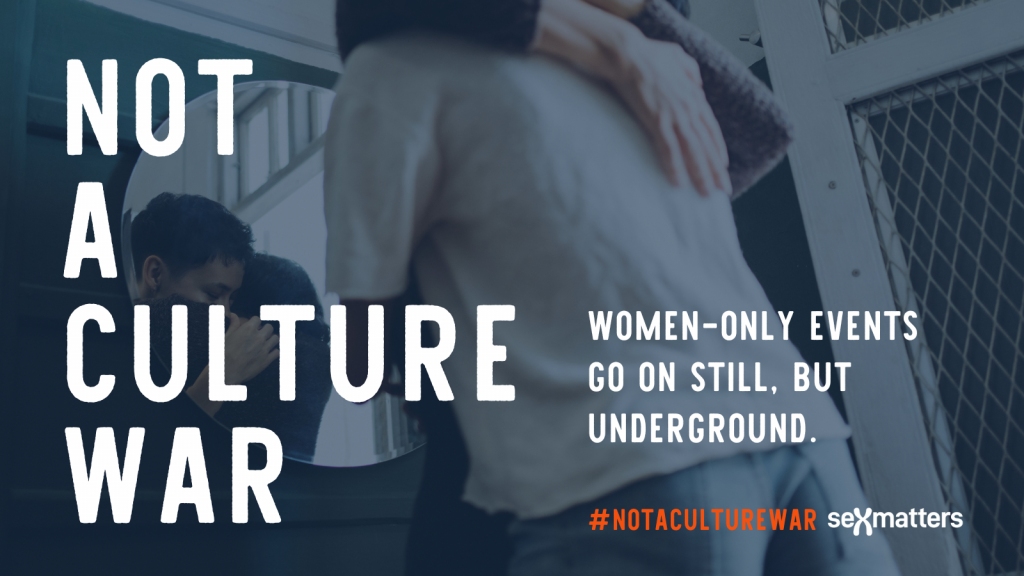This post is part of the Stand up for single-sex services campaign |
Not a culture war: what’s really at stake

The law is not working for women.
The Equality Act protects women (and men) from sex discrimination. It also provides for single-sex and separate-sex services to be lawful, where they are needed. And it requires public authorities to think about women’s particular needs and whether to take action to reduce inequalities they face (alongside people with other protected characteristics).
But none of this works if the law, and those implementing and enforcing it, are not clear about the two sexes. In practice women’s rights have been undermined by the conflation of sex with the idea of “gender identity”.
This is not about a difference of values, as implied by the “culture war” label. There is widespread support for people with transgender identities to be protected from harassment and discrimination at work or as users of services. But this does not mean undermining single-sex provision, proper safeguarding and free speech. Bending over backwards to meet trans demands is not compatible with protecting the rights of others. A serious review and reset is required.
Women are being harassed at work
Women who argue for rights on the basis of sex are targeted for harassment and discrimination at work, and called “TERFs”, “bigots” and “transphobes” for saying that women have particular needs and life experiences which are different from men who identify as women.
Women have been victimised, harassed, wrongly sanctioned or unfairly dismissed from their jobs for expressing lawful, reasonable views about the need for single-sex provision to be based on the reality of sex not claimed gender identity. Despite the Forstater judgement protecting their beliefs in the workplace, and the subsequent run of employment tribunal wins, most recently the Jo Phoenix v Open University and Adams v Edinburgh Rape Crisis Centre cases, many women still feel it is too risky to speak up in defence of their rights at work if it means opposing trans demands.

Specialist services for women are threatened
Women need male-free spaces and services to recover from male violence – fleeing domestic abuse, recovering from rape, seeking counselling or a support group after sexual assault. But those services are now often expected by commissioners to admit trans-identifying men on the basis that “transwomen are women”. Many local authorities and the Scottish government have made this a condition of funding. Men-only services and trans-only services remain, but women and girls, the most likely victims of such assault, are being denied what they need. The extent of the problem and the harm caused is under-reported because those standing up for single-sex provision in the women’s services sector face hostility and pressures to undermine their approach, as our research showed.
Everyday privacy, dignity and safety for women is undermined
Women can no longer be confident that a man won’t walk into the women’s toilets at work, the female changing rooms at the gym or the women’s and girls’ showers at the leisure centre. Girls’ toilets and changing rooms at school can have a boy there, if he says he feels like a girl. Something we long took for granted, that separate-sex provision is preferred for intimate activities like taking your clothes off or going to the toilet, is being lost to protect the feelings of people who deny their sex. Many women have told us that this is preventing them accessing services and feeling comfortable. A group of nurses have threatened to sue their NHS hospital employer in Darlington over its policy of allowing transgender male colleagues to use the women’s changing room. One of the nurses said:
“I came in to get changed one day and he was just there getting changed.…Out of the corner of my eye I saw him getting changed down to his boxers. He proceeded to take his time and wander about. You could clearly see he had male parts. He looked like a man. I didn’t feel threatened, but I thought ‘wow, this is wrong, this is a female changing room.’ “
Male officers are allowed to strip-search women
In the police, the prison service, border force and HM Revenue & Customs, the validation of trans-identifying men is being put before the right of detainees to be searched only by an officer of the same sex. This means women can be strip-searched by male officers who identify as women. Searching policies prioritise the trans-identifying person, whether this is a male officer who wants to do his job as if he were a woman, or the male person who wants to be searched by a woman.

Women and girls are being denied same-sex care
For many people requiring care, especially intimate care, the sex of the carer is of utmost importance. But policies in the NHS, and social-care provision are increasingly “gender neutral”, and where there are trans-identifying health and social care staff, their desire to be affirmed in their identity is put ahead of the privacy and dignity of female patients who have asked for a female clinician or care worker.
The NHS confederation tells leaders that patients have no right to know the sex of a healthcare worker, and that a patient cannot request a different member of staff where there is no clear clinical benefit.
In October 2022, Teresa Steele was attending a pre-operation assessment at the private Princess Grace Hospital in London when a male nurse with a female “gender Identity” breached her privacy. When she complained the hospital responded by cancelling the life-saving operation, citing a “lack of shared beliefs”. There was a public outcry, the hospital apologised, and the operation was reinstated. But many hospitals and NHS trusts continue to operate on the basis of gender self-ID and refuse to guarantee same-sex care.

Lesbians and gay men are denied free association
Lesbian bars and associations are now expected to admit trans-identifying men who are attracted to women – heterosexual men, in other words. LGB organisations that recognise same-sex attraction are accused of not being “inclusive”, including by the National Council for Voluntary Organisations.
Lesbians have been pressurised to accept such men, and kicked off dating apps for expressing a preference for biological women. Gay men also report discomfort at being approached by trans-identifying women. Sex by deception, pretending to be the other sex, is a crime in the UK but some trans-identifying men and women are attempting to do just that, and organisations are promoting the idea that this is acceptable. The CPS has tried to issue guidance which blurred the boundaries of consent by conflating sex with gender identity.
Safeguarding
Children and vulnerable adults need special protection. Safeguarding is a set of practices designed to ensure that organisations protect children from maltreatment, prevent the impairment of their mental and physical health or development, ensure that children grow up in circumstances consistent with the provision of safe and effective care, promote the upbringing of children with their parents where this is in their best interests and take action to enable all children to have the best outcomes. Systems for safeguarding children depend on schools and other agencies working in partnership with parents and carers as far as possible, being vigilant, sharing information and assessing risks. Pretending not to know what sex a child is, or what sex a person they are interacting with is, has the potential to undermine safeguarding cultures and creates loopholes that may be exploited.
For example, Girlguiding is an organisation for girls. It says its leaders are “women-only” positions. As part of its safeguarding arrangements it tells volunteers to avoid situations where they would be alone with a young member. “Ideally, the third person present should be an adult woman who knows the girl.” But Girlguiding’s trans policy, developed together with Stonewall and Gendered Intelligence, is to appoint men who identify as women into female-only positions and treat these men as if they were women. Guide leaders and parents faced with an unexpected man acting inappropriately fear that they will be dismissed as “transphobes” if they report concerns.
Organisations that care for children must assess potential risks posed by staff and other adults. They must work to avoid becoming magnets for those seeking out organisations with weak controls. The practice of “safer recruitment” includes values-based interviews where candidates are asked searching questions to explore their motivations. Recruiting a person who fails to be transparent about their sex, their personal history or their motivations undermines safer recruitment. If those undertaking recruitment are themselves not allowed to be honest about who is a man and who is a woman, the system for due diligence breaks down.
Women and girls are losing safe, fair sport and recreation
Female-only sport is essential for women and girls to have fair competition. In many team sports and all combat sports it’s also critical for safety. When women and girls have to play adult males, it is grossly unfair and can be dangerous. This is affecting thousands of women at all levels across the UK, as this report by Fair Play For Women shows. The pressure to be accommodating – or just to be quiet – means these stories are not easily heard, but some brave women have spoken to the media about their experiences. Here’s a recent example in ice-hockey. In English football alone there are 72 male players registered and approved by the Football Association to play in women’s teams and leagues. Each one causes problems for dozens of women around them.
It’s not just competitive sport. Women-only sessions for swimming, gym classes and the like are important for female participation, for religious or cultural reasons or personal preference. Knowing the changing rooms will be male-free is important too but this has largely been lost.
Time for proper discussion
These are matters of importance to society, not confected issues or culture wars. No one should dismiss them as anything other than genuine concerns. They merit the thoughtful attention of politicians. Everyone’s rights matter. Where there are conflicting demands, they must be acknowledged and addressed.
